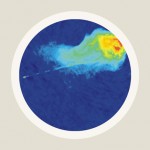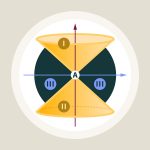Dictionary
particle physics
The branch of physics that deals with particles that are, to the best of today’s knowledge, not made up of more fundamental sub-units, for instance with electrons, quarks or neutrinos. Also included is the study of some species of particles that do have more elementary constitutents, such as protons or neutrons, but not of larger systems such as atomic nuclei (that would be nuclear physics) or, even worse, whole atoms. Questions such as, whether the particles nowadays thought to be elementary really are elementary, or are, for instance, different manifestations of one and the same species of string, fall within the scope of particle physics.
The theoretical tools of particle physics are the so-called quantum field theories which allow the description of elementary particles on the basis of both quantum theory and special relativity, while the main experimental tools are particle accelerators in which particles are accelerated and then brought to collision.










